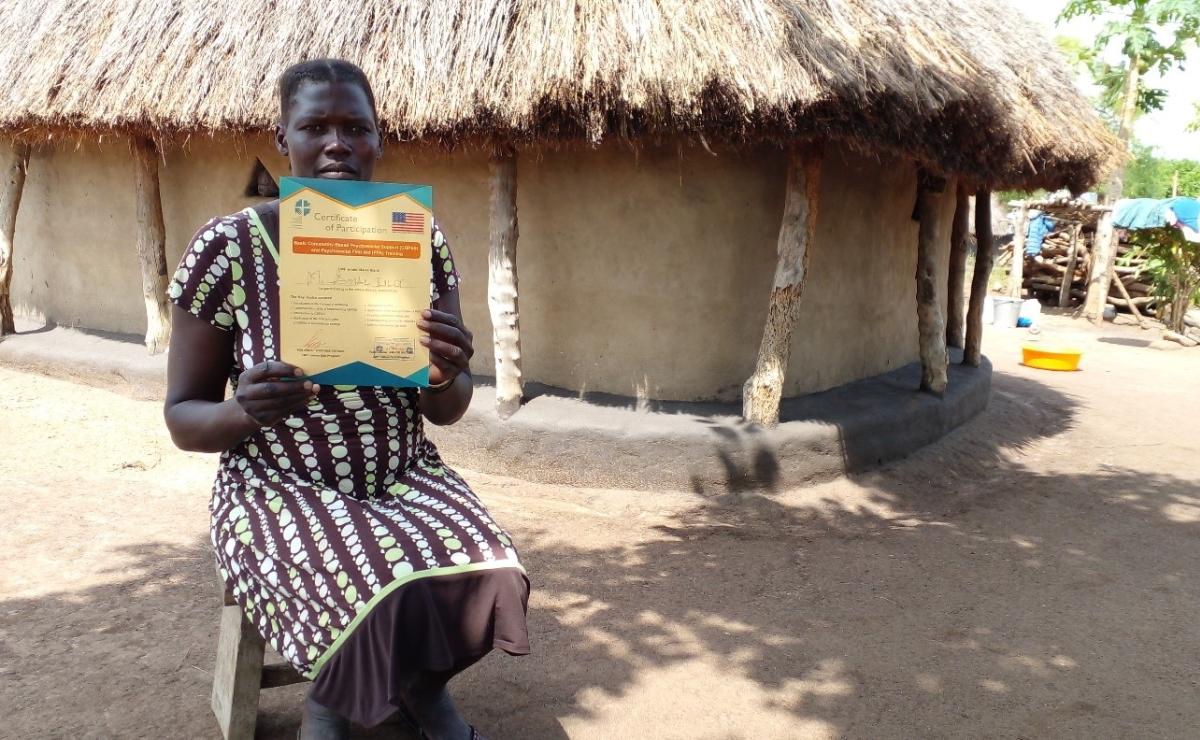Community-based Interventions help South Sudanese refugees to heal from mental distress

36-year-old Lilly Amal, a South Sudanese refugee, is not letting her mental illness history hold her back. Instead, she uses it as a platform to support others with mental distress. Thanks to the Department of State’s Bureau of Population, Refugees, and Migration (PRM) through the Lutheran World Federation.
For years, Amal has struggled with trauma after losing many of her relatives killed during the war in South Sudan. She abandoned everything and escaped to Uganda, where the government settled her in Palabek settlement in the country’s Northern region.
“I found life very challenging as I could not afford basic needs for the children and I, ” says the mother of five, “I had nothing with me,”. Consequently, she contemplated suicide other than watching her children suffer. Either way, she thought that abandoning the children to return to South Sudan would be better.
“I was sad; I spent time crying, worried, and regretting why I was born,” Amal recollects. It was until the LWF psychosocial team intervened at the start of 2020 that Amal was able to blow away the cobwebs.
Under the Reconnecting Lives, Vision, and Empowerment (ReLiVE) project, she was identified by the community leaders who referred her case to the team.
The team assessed and provided her individual counselling sessions coupled with regular home visits. “This built my coping abilities, resilience and positive stress management skills,” she says.
Back on her feet, Amal expressed interest and got appointed during the selection of Community Based Psychosocial Support (CBPSS) resource persons in the second project phase in 2021.
“With others, we were trained to identify, support and refer other refugees with mild to severe signs of distress,” Amal states with joy.
The CBPSS strategy, which uses ambassadors, has dramatically improved access to mental health services in Palorinya, Palabek, and Adjumani settlements in Northern Uganda and Kyangwali refugee settlement in South Western Uganda.
The ambassadors provide psychological first aid and access to essential interventions like counselling and identifying refugees with signs of distress.
Many refugees have testified benefitting from the trainee ambassadors who understand the local challenges and counsels them from experience with a focus on the person, not just their symptoms.
About 147 kilometres away from Palabek settlement, in Boroli settlement located in Uganda’s West Nile Adjumani district, Betty Stanley Oleyo, a single mother of six biological children and six other adopted children, found it effortless to access psychosocial services.
Located near Uganda’s border with South Sudan, Boroli settlement, opened in 2015 to host South Sudanese refugees who fled insecurity in their country of origin, is among the territories where LWF implements the PRM funded project.
Oleyo, too, was experiencing many traumatic events like imagining being on guard, lack of sleep, nightmares and, at some point, thought of attempting suicide when she attended the cultural gala last year, one of the activities conducted under the project.
Aimed at promoting peaceful co-existence and improving mental health and wellness, the Cultural gala unites different tribal/ethnic groups of refugees and host communities to share their cultural backgrounds through music, dance and drama, and cooking competitions among others.
“There were also testimonies where other refugees shared their recovery journey from mental distress after receiving support from services from LWF,” the 37-year-old notes that she came to believe that she could also get back on her feet.
“I was inspired to seek support from one of the psychosocial ambassadors I followed after the event,” Oleya added.
Four months later, she is on the road to full recovery; her life is far better than before. She has achieved so much, mentally, physically, and financially in such a short period. She has joined the local MDD group and was elected as their chairperson, can conduct income-generating activities like sewing, and has secured a job as a mentor at one of the Early Childhood Development (ECD) centres.
“I am happy and feel blessed because I can even take my children back to school,” Oleya testifies to the power of community-based psychosocial support services.
The continued support and engagement of community structures like CBPSS ambassadors have ensured sustainability and aligned the project interventions to the local challenges.
Amid repetitive conflicts in their countries, refugees remain at risk for mental disorders, and the need for psychosocial care interventions remains high.
-END-

